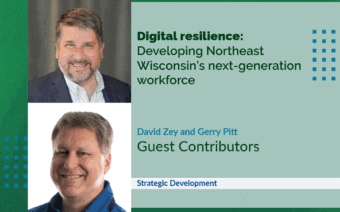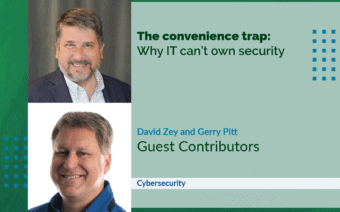
November 13, 2023
GREEN BAY – Intellectual property (IP) is defined as a work or invention that is the result of creativity to which one has rights and for which one may apply for a patent, copyright, trademark, etc.
Protecting one’s IP from theft is a struggle businesses throughout the country, including right here in Northeast Wisconsin, deal with on a daily basis.
A recent panel discussion at Northeast Wisconsin Technical College (NWTC) in Green Bay – the U.S. Patent and Trademark Office’s IP Road Show – focused on informing businesses and members of the community about the dangers of foreign entities – specifically the Chinese Communist Party (CCP) – stealing intellectual property (IP) and what can be done about it.
Rep. Mike Gallagher (R), the U.S. representative for Wisconsin’s 8th congressional district and chairman of the Select Committee on the Chinese Communist Party, led the discussion and was accompanied by area business leaders and field experts at the event.
“On one hand, it’s great we can get together and talk about this, but on the other hand, it’s unfortunate businesses in Northeastern Wisconsin have to deal with this,” Gallagher said. “The United States is the global center for innovation. We have a world-class education system, a system of limited government that allows individuals to experiment and make original mistakes and we have the rule of law that protects those ideas from theft.”
Gallagher said just as a good magician never reveals his or her secrets, entrepreneurs/businesses shouldn’t have to share the secrets that make their respective products great.
“That’s exactly what our adversaries – chief among them the Chinese Communist Party – are seeking to do,” he said. “The CCP has launched an unprecedented process of IP theft.
Gallagher said according to the Blair Huntsman Commission, IP theft conducted by the CCP against America accounts for $300 billion a year.
“And that’s a low estimate,” he said. “They called it the largest transfer of wealth in human history. We shouldn’t accept that.”
At the event, Gallagher said it’s important to note that the CCP is the culprit in IP theft, not the Chinese people with whom the United States has a good rapport.
“The primary victims of the party’s increasing authoritarianism are the Chinese citizens,” he said. “We have to remind ourselves of that distinction so we don’t go overboard and don’t target Asian Americans or anybody from the Indo-Pacific region as we seek to push back against the CCP.”
Hearing from the panelists
Aaron Popkey, director of public affairs with the Green Bay Packers, said the NFL is a $10 billion to 12 billion industry, and consumer goods are a big part of that.
“IP theft from foreign markets hurts American companies,” he said. “We’ve seen an increase in the challenges in the area of counterfeit goods. There are several things the Packers, along with the NFL, do to work against that. We do our best to protect our fans who suffer from counterfeit goods.”
Popkey said sometimes, “fans aren’t even aware they might be purchasing counterfeit goods.”
“The businesses that produce these authentic goods – either around here or in accredited markets around the world – in a legit, quality way, suffer as well,” he said. “The price might look good (online), the seller looks good and you order it. As it turns out, you get it, and the quality might not be there because it was made cheaply.”
Popkey said the club and the NFL are continuously working on IP theft.
“We have our own staff council who works on this, and the NFL has people where that’s all they do is work on IP stuff and counterfeit goods,” he said. “A lot of time and resources are spent on getting a product licensed the proper way (through the NFL), and these counterfeit agencies undermine all of that. If the Packers notice things (online), we give that to the NFL.”
Popkey said cost can sometimes be a factor.
“We know (counterfeit goods) are inexpensive if made overseas,” he said. “That’s a challenge in how that gets marketed.”
Ben Wolfgram, co-founder of BenShot, an Appleton-based creator of unique glassware designs, said his company dealt with a counterfeit glassware company for five years.
“Lucky Shot was using our IP to create counterfeit glassware in China,” he said. “In 2015, we designed a shot glass with a bullet inside – it’s been popular. Lucky Shot copied us, took our exact design, sent it to China (for manufacturing), brought it back and then advertised it as American-made. We filed a lawsuit about false designation origination – it took about five years, but we finally won in federal court. It took a lot of money and time.”
Wolfgram said when BenShot was copied, it only had 16 employees, a small local business – therefore “we had to be strategic.”
“A lot of marketplaces – Amazon, Etsy, Alibaba – are good at taking things down, but sometimes things get through and there are mistakes,” he said.
What more can be done?
Nathan Davis, legal director of patent and intellectual property litigation at Whirlpool Corporation/Insinkerator, said the first problem with counterfeit products is they look like real products.
“Before you begin to go after those counterfeit products and take action, you need to be able to tell the difference between the fake products and the real ones,” he said. “We have two full-time people playing Whac-A-Mole every day to keep these things off the big sites that consumers go to – one of them being Amazon.”
Despite the efforts, Davis said counterfeit products still get through.
“After you find you have a counterfeiting problem, you have to figure out how to go after it,” he said. “You could spend unlimited money going after counterfeiters – (but) they’re resilient, they have a big profit motive, they’re not investing in filtration technologies, etc. We’re not seeing them in big box stores, but more e-commerce.”
Davis said he has a simple rule when looking for counterfeiters – looking “where we think consumers are going to shop.”
“That’s where we put our resources,” he said. “Besides Amazon, Walmart.com would be another one. It’s the sites that would pop up on the first page of Google search results. We file lawsuits if we have to, but it’s much better if we can get people to take (the site) down before a lawsuit is the only course of action.”
Davis said you can also seek help from state and local law enforcement, which has the jurisdiction to go after counterfeiters.
Alan Cheslock, partner with Michael Best & Friedrich, LLC in Manitowoc, said it’s a lot easier getting counterfeit products off e-commerce sites today compared to 10 years ago.
“It’s a strategy that should start in the United States,” he said. “If you can get 90% of the problems taken care of here, then it’s a lot easier to deal with.”
The NWTC event was part of a series happening across the country to help develop strategies for protecting and enforcing intellectual property.
 Welcome to Camp Elsewhere – a woodsy retreat
Welcome to Camp Elsewhere – a woodsy retreat A ‘Haven’ of blueberries awaits pickers in Bear Creek
A ‘Haven’ of blueberries awaits pickers in Bear Creek








